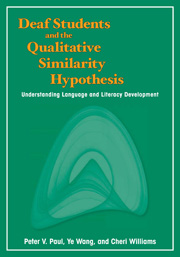Understanding Language and Literacy Development
Peter V. Paul, Ye Wang,
and Cheri Williams
|
View the table of contents. Read chapter one. Read reviews: Reference & Research Book News, The Midwest Book Review, Journal of Deaf Studies and Deaf Education. |
$85.00s print edition $85.00 e-book |
Deaf Education, Volume 3
The difficulty that deaf and hard of hearing students have in attaining language and literacy skills has led to postulations that attribute their struggle to a developmental deficit. Recent research reveals, however, that deaf students acquire language structures, produce errors, and employ strategies in the same fashion as younger hearing students, though at later ages. The ability of all students to learn language and literacy skills in a similar manner at different stages forms the foundation of the Qualitative Similarity Hypothesis (QSH).
This volume describes the theoretical underpinnings and research findings of the QSH. It presents the educational implications for deaf and hard of hearing children and offers reason-based practices for improving their English language and literacy development. This collection also stresses the critical importance of exposing educators to the larger fields of literacy and second-language learning. Providing this background information expands the possibility of differentiating instruction to meet the needs of deaf students. Deaf Students and the Qualitative Similarity Hypothesis includes commentary on the QSH for both first- and second-language English learners and reflects on how the QSH can effect a better future for all language students.
Peter V. Paul is a professor in the Department of Teaching and Learning in the College of Education and Human Ecology at The Ohio State University.
Ye Wang is an associate professor of psychology and education and coordinator of the Education of the Deaf and Hard of Hearing Program at Teachers College, Columbia University.
Cheri Williams is a professor in the School of Education at the University of Cincinnati.
Print Edition: ISBN 978-1-56368-584-2, 7 x 10 casebound, 278 pages, 13 tables, 1 figure
$85.00s
E-Book: ISBN 978-1-56368-585-9
$85.00
To order by mail, print our Order Form or call:TEL 1-800-621-2736; (773) 568-1550 8 am - 5 pm CST
TTY 1-888-630-9347
FAX 1-800-621-8476; (773) 660-2235
